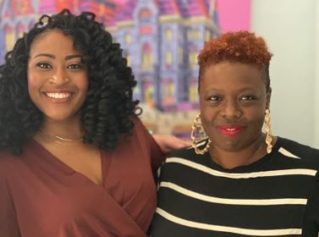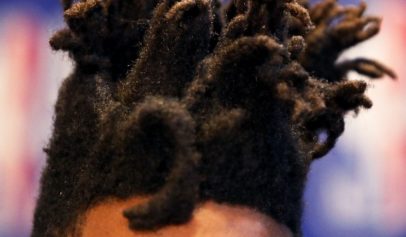In the early 1940s, before my grandparents joined the Seventh-day Adventist Church, before they embarked on a lifelong conflict between Seventh-day Adventism and African traditions, my grandparents kept long hair. My grandmother, I am told, kept long kinky hair that intertwined into beautiful micro dreadlocks on her scalp. She expressed her unaltered African beauty until the late 1960s to early 1970s when she decided to join the SDA. There, where my grandmother and many women were instructed on how to be proper Christians, good God-fearing African women had to either shave or cover their long kinky African hair during Sabbath.
While the church was waging a war against the natural African appearance within the church, the British colonialists were waging a similar war in the Kenyan highlands where my grandfather worked in the tea plantations. The bushy Afros and kinky dreadlocks were being replaced by smooth scalps, shiny in the afternoon tropical sun and freezing in the morning cold of Kenyan highlands when my grandfather and his compatriots would be roused at 4 a.m. by the loud bells to work in the British-owned tea plantations.
It is 2017, I am in America, and I am checking boxes of things I need to do in preparation for my upcoming job interview. I check the box with haircut against it. I have just had one. I look like a schoolboy from my rural home in Kenya. Teachers in rural Africa continue to impose on school kids the same demands the colonialists imposed on their servants. Students must be clean-shaven, wash their uniform daily to get rid of the natural African smell, iron their shirts and pants, and finally, tuck their shirts properly into their shorts or pants to complete the image of a disciplined African. These orders are hurled in a military fashion with accompanying corporal punishment when defied.
This is happening at a time when Mark Zuckerberg is running a multibillion-dollar company in T-shirts and jeans. And this is happening in Africa, where families not only struggle with access to water for household use, but also the burden of accessing food and clothing still weighs heavily of many families.
I look at my image in the mirror and smile nervously at the overwhelming reality around me. In 2016 the police killed about 285 black people in America, according to Project Guardian.The images of these people that got splashed on television were often of black men in dreadlocks. These images have been used traditionally to achieve many objectives including bargaining the innocence mostly of white police involved in the killings. They have also been used to portray black men and women as savage thugs who deserved the fates that befell them.
The psychological warfare against black hair has been successful even amongst Black people themselves. Earlier this year, my Nigerian friend told me that she feels a chill down her spine when a dreadlocked young African-Americans walk into the bus she takes to college. She says she fears the dreadlocked individuals could be armed and potentially rob her. She does not have the same fears around clean-shaven people, while to her dreadlocked white people easily pass as harmless, easygoing hipsters.
In Africa, no group was so glaring in their unapologetic non-conformist appearance like the dreadlocked Mau Mau. The Mau Mau like the Luo community where I come from in East Africa, and the Masai amongst other African communities, believed that the human hair was an extension of the human being. They had strong beliefs in the power and the identity bestowed to an individual and the community by their hair. For example, amongst the Luo, the hair was only shaven to the scalp during the mourning period for patriarchs, matriarchs and important people in the community. A man or a woman with a clean-shaven head in the marketplace was accorded sympathy and assistance, as people knew they were bereaved. Masai Moran, the warriors of the Masai tribe, still announce their status to their community with dreadlocks bathed in red ochre.
During the struggle for the Kenyan independence, the Mau Mau against all odds decided to keep long dreadlocks as an identity. The image invoked dread and fear among the British, while at the same time the Mau Mau were forced to hide in the depths of forests in central Kenya because the dreadlocks gave them away easily. One would ask, why if the Mau Mau were involved in a guerilla war, meaning they needed to blend with their surroundings, would they give themselves away by having dreadlocks?
The Mau Mau must have resisted the attempts by the colonialists working in tandem with Christianity to change the image of the African in conformation with their preconceived standards of proper servants. By rebelling against the British and Christianity, the Mau Mau first and foremost rebelled against this identity prescribed by foreigners. Secondly, hair is tied to spirituality amongst many African communities. That is why shaving of the dead’s hair is part of the final rites before burial in a good number of African cultures.
Also, amongst the traditional African medicinal practices, when all other healing options are exhausted, the medicine man asks for the hair of the sick so that he can mix it with potions to ward off evil spirits and heal the patient. Hair and spirituality are tied so deeply that when the first barbershops started mushrooming in rural Kenya, people would request to have all their hair collected so they could dispose of it themselves.
The Mau Mau, therefore, could not lose this important piece of spirituality for the sake of blending in. The Mau Mau, by keeping the image defined by long dreadlocks, won the psychological war by instilling fear right into the hearts of the British.
I run my fingers across my scalp and realize that I am conforming in order to increase the prospects of getting employed. The prospects of being accepted as a proper African within middle-class America.
Norbert Odero, is a Kenyan scientist based in the United States. He has been published in both scientific and literary journals such as The Lancet, NEJM and Africa is a Country and Brittle Paper blogs. He can be followed on twitter at NorbAwino


